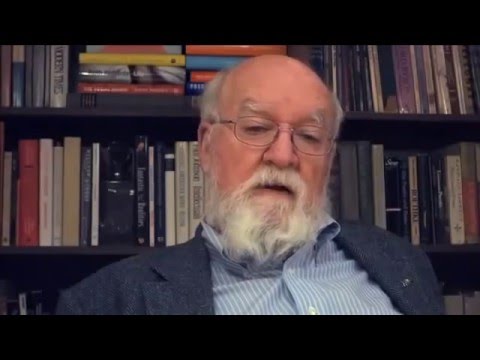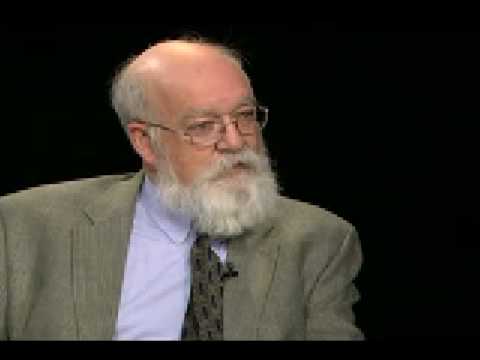Philosophy Overdose
“The vision of the brain as a computer, which I still champion, is changing so fast. The brain’s a computer, but it’s so different from any computer that you’re used to. It’s not like your desktop or your laptop at all, and it’s not like your iPhone except in some ways. It’s a much more interesting phenomenon. What Turing gave us for the first time (and without Turing you just couldn’t do any of this) is a way of thinking about in a disciplined way and taking seriously phenomena that have, as I like to say, trillions of moving parts. Until late 20th century, nobody knew how to take seriously a machine with a trillion moving parts. It’s just mind-boggling.”
This video is from Edge. You can find the video and transcript here: http://www.edge.org/conversation/the-normal-well-tempered-mind
Source




I'm so excited for neuroscience and especially as it pertains to consciousness and its emergence/development.
I've long been a fan of Dawkins' book The Selfish Gene (and The Extended Phenotype) and it tickles me pink to see how it seems to have reverberated throughout the years and affected how we approach understanding so many other seemingly disparate fields. Even cosmologists are applying principles of " biological design space" to hypothesize variable laws and a "Megaverse". And here, Dan suggests warring neurons (just as in warring genes) and I'm immediately drawn to pondering the observance of patterns in which neurons, or groups thereof, are given a selective bonus due to their immediate environment including the totality of an individuals genes, other neuronal disputes/alliances and even possibly other individuals and their behavior affecting development thereof. Trying to tie all of this together is certainly a daunting task and I'm glad we have people like Dennett, Rama, Koch, etc to break it down and present the forefront for us laymen. And indeed, people like BradYounger who is so kind as to take the time to pool resources together for everyone to absorb.
Thanks for another great vid Brad.
In relation to this, I wonder how Doug Hofstaedter's work on Creative Analogies is coming along?
is it just me or does Daniel Dennett seem a bit inebriated in this interview?…still a great piece though
Some interesting brain tricks I have learned: Make the subject you want to understand into a place, an environment, something immersive where you can play. This makes use of our minds' topological abilities. – Assign personalities to things which are dynamical and absorb them as known entities. This leverages our brain's affinity for beings and empathy. – Believe that an independent agent is working out problems on your behalf in a castle or warehouse in your mind, visualize this helper, trust them to keep at it. This seems to give rise to an independent subroutine in the subconscious. – When approaching a subject, start with a fuzzy overview of the whole, and resolve the details bit by bit. This takes advantage of our propensity to see wholes, or gestalt. – To aid memory, imagine a series of rooms where notions are stored. Visualize it as vividly as you can. – Practice meditation, which makes room for the mind to do its own thing. But, make use of doubt, liberally! This stems the flow of credulity and "reverses the flow of the river," and makes us less likely to submit to our mistaken intuitions. – Keep the notion of Gestalt in mind when taking in anything your mind attends to, because it makes wholes out of things. But, also be aware that every whole is a part of an encompassing Gestalt, and composed of parts, which themselves are Gestalt. – Get some Latin and Greek under your belt, to aid association. Literature, music, and poetry help loosen this up. (Numerology does too, but not at all helpfully!) And, make an effort to really Understand things, whatever interests you, at a Naturalistic level. Your brain might have supernatural experiences, but always remind yourself it's brain-stuff, not "out there." In Zen such self-deception is called Makyo. – Know that leaving a room, going in and out of spaces, passing through doors, actually changes your mind and initiates a "store command." – Following these general principles will reveal others, which take advantage of the innate circuitry of the brain. It acknowledges that the mind is not unary, even if its serial self-feedback gives that impression, and its processes are independent of our conscious will. We can prime it and practice things, but once instantiated these habits develop their own momentum. Will this make you schizoid? It doesn't have to! Let it be. Onward, psychonauts!
It's an interesting philosophical point as to whether the brain can ever understand itself…
..thank you
maybe the cortical cells are possessed by souls
neurons, like all cells, are semi-autonomous agents to which can be ascribed intentionality etc. but that does not negate the observation that in its signal processing operating mode, a neuron's axon either fires or does not. and yes, the rate of firing influences the release of neurotransmitters which in turn influences whether they will affect receiving neurons, but nonetheless the heart of the matter is that either the axon fires (pulses) or does not. and that therefore, regardless of its quasi-independent life of its own, the neuron is an information processor. McCulloch-Pitts model is a simplification, but that does not negate the observation that neurons, insofar as the functions and behaviour of the mind are concerned, are nothing more metaphysical than the basic building blocks of information processing circuitry, and that therefore the concept of the mind as a computer is not invalidated. so you have to correct your correction Dan, because you were right the first time around 🙂
9:57 "control in brains is very different from control in computers" – surprising to hear such a senile oversimplification coming from the mouth of Dennet. it's only very different from control in Intel processors etc, but that does NOT make a brain a non-von Neumann machine, nor does it imply brain processes are not Turing-complete. It just means that there are more stored-program machine architectures than the one sitting on your desk or lap – i would love to be able to live long enough to see some of them being made and used. Dan Hillis showed the way, but i havent followed developments to know whether anyone else has taken up the reins yet.
perhaps the best examples of animals with well-tempered clavier minds are the featherstar, the cockroach and the crocodile: three brainy species that have survived for hundreds of millions of years with little adaptation. no doubt among their populations are individuals with mental disorders, but so far as i know most of them have sufficient sense not to waste their lives writing comments on YouTube.
24:27 "Cultural Fleas". oh yes, you hit the nail on the head there. however, even after science has given people reasons not to swallow the bullshit doublethink talk of megalomaniacs, evolution is still struggling along at a snail's pace and the new cultures are unlikely to be much improvement on the old as competition once again rears its ugly head.
26:40 on behalf of my fellow child chimpanzees, i wish to complain that Dennet misrepresents us. just because we are indifferent to your pathetic dry and dusty human culture language (except when it comes with promises of sweets) does not mean we are not eager and able to learn the rich and expressive languages of our own species
39:52 "hypocrisy is the structural problem in religion today". ah, if only that true – the biggest problem is not those who only pretend to believe in order to have an easy life as a pastor or professor, it's not even those who truly do believe they will get seven virgins for being willing to kill to prove their faith is truer than yours. No, the biggest problem for the majority of people is the minority of people who are smarter than the rest of us and have found out how to monopolise and manipulate the economic system, whether by starting false flag wars to sell armaments or by defrauding simple-minded investors with pig-in-a-poke "structured investment vehicles" or by sequestering the power of money supply, becoming godlike celebrities or plutocrats behind the scenes pulling the strings of puppet presidents etc. it's the hypocrisy of trickle-down capitalism that damages the masses. it may be glorious to get rich, and it may be glorious to defeat your enemies, but it is inglorious to be consumed by the pursuit of glory.
Its seems like MEMES are struggling to survive and thrive in a competitive environment. That the correlation between a meme and truth is less relevent than its ability to survive in a cultural environment. If this true, then perhaps we should think about packaging INTELLIGENT memes in strategic ways that would push the envelope to the public, allowing that meme to thrive. A battle of PR if you will.
Like the "selfish gene" image help understand evolution, the "selfish neuron" idea created by Daniel Dennett help understand our own brain, what allow humans to shine.
Oh i love the internet. DC Dennett lecturing to me in my own house. My brains just a little bit bigger…
Consider a computer C able to prove English sentences. Assume C is as smart as an average human and consider the sentence G_C: 'C does not prove G_C'. C doesn't prove G_C because it knows it would be turning G_C false, if it did; hence G_C is true and C does not prove it. G_C outgoedels C.
You cannot do the same to a human H able to understand the outgoedeling procedure. If you try with G_H: 'H doesn't believe what G_H states', you get a paradox, because H doesn't believe what G_H states (for H knows he would be turning it false, if he did) but as this is precisely what G_H would state, H believes what G_H states.
Most probably, G_H (like the Liar sentence) is unable to express a proposition while G_C is undoubtedly able to do it. Computers can be outgoedeled. Humans cannot.
Ultimately, the difference is that computers deal with syntactic items (sentences) while humans deal with semantic ítems (propositions). WARNING: arguments are welcome; offensive comments will be deleted.
The statement "the mind is not like any computers we have ever seen before" is the same as "the mind is not a computer". Computation arises out of awareness – awareness does not arise out of commutation or out of 1's and O's.
The search for God is the search for power or at least survival of the individual and society. This will never end as long as people are ONLY people because people are weak. We will always need to tap into a power greater than ourselves. This could be a virtual power in the mind — a software program that converts despair into hope.
This guy is a fraud.
Josca Bach should talk with Dan.
Wow listening to a philosopher on my phone.
I do not find it amazing that children already come to college with this ability to think in more modern computer driven abstract terms; amazing to me is the fact that religion (right or wrong) and governments, and indeed schools have suppressed truths and ideas such as these for so long, that it took us this long to get where we are. We should be 1000 years more advanced than we are right now.